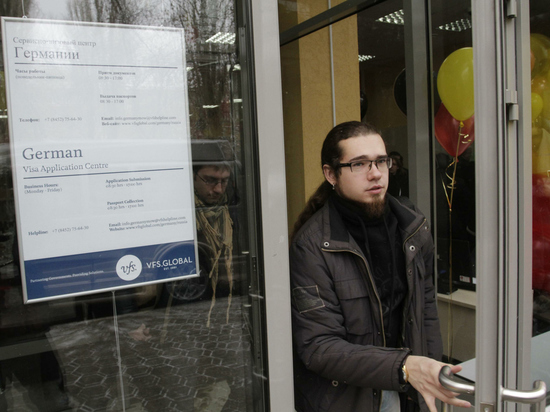Details of new European visa restrictions for Russians revealed
[ad_1]

Following an informal meeting in Prague on Wednesday, EU foreign ministers agreed to suspend the visa agreement with Russia. The move will reduce the number of Russians entering the Schengen area, but will not result in a complete ban on tourist visas.
EU foreign ministers agreed to suspend an agreement with Moscow on visa travel to limit the number of Russian citizens entering EU countries for recreation and shopping. At the same time, according to The Guardian, the restrictions fell short of the complete ban on tourist visas, which is required by some countries in Central and Eastern Europe.
At the talks in the Czech Republic, EU foreign ministers tried desperately to show unity over anti-Russian sanctions, but failed to overcome differences over whether all Russian citizens should be subject to visa restrictions.
At a meeting in Prague, 27 EU foreign ministers pledged to suspend a 2007 visa facilitation agreement with Russia that makes it relatively easier for Russians to obtain travel documents to European countries.
Now it is planned to complicate and make it longer the process for Russian citizens to obtain short-term visas to enter the European zone without passports – the Schengen zone, consisting of 26 countries (these are the majority of EU members, as well as Iceland, Liechtenstein, Norway and Switzerland).
It is also expected that the visa fee for Russians will increase from 35 euros to 80 euros. The issuance of multiple-entry and long-term visas will be in doubt, but the terms for issuing a visa can stretch up to six months.
EU High Representative for Foreign Policy Josep Borrell said there had been a “significant increase in border crossings” from Russia to the EU since mid-July, which he described as a “security threat to these neighboring states.”
Although the EU had already suspended an agreement with Russia on visa facilitation for officials and businessmen shortly after the outbreak of conflict in Ukraine in February, ordinary Russians may have continued to travel to the EU on vacation or for other reasons.
Wednesday’s informal agreement still needs to be translated into EU law, and it’s not yet clear when the suspension will take effect. Josep Borrell explained that it will become more difficult and longer for Russians to obtain a visa in an EU member state, and the number of new visas will be “substantially” reduced.
Students, journalists and “those who fear for their safety in Russia” will still be able to get visas, according to the Associated Press.
The European Commission has been tasked with making recommendations on what to do with the 12 million visas already issued for Russians. Czech Foreign Minister Jan Lipavsky acknowledged that there is no quick solution to the problem. “There are different ways forward, and we cannot answer this question right away,” he said, without elaborating.
The common policy would mean EU member states could continue issuing visas to Russians after France and Germany opposed a total ban.
Some eastern EU states have said they will seek a regional visa ban unless a pan-European agreement is reached.
Ukrainian Foreign Minister Dmytro Kuleba also insisted on a tough response, demanding a ban on issuing visas to Russians. Not surprisingly, he called the decision of the informal meeting of EU foreign ministers a “half-measure.”
Nearly 1 million Russians have entered the EU through land crossings since the outbreak of the conflict in Ukraine, according to Frontex, the border agency. Most came from Finland and Estonia and had visas, residence permits or dual citizenship. They are believed to have used alternative travel routes after the closure of European skies for almost all Russian aircraft as part of EU sanctions.
The uniform rules are supposed to be applied in the 26 countries that make up the European passport-free zone, but Estonian Foreign Minister Urmas Reinsalu said that “determining the issues of entry into our territory is our national competence in accordance with the principle of national security.”
Over the years, several countries have reintroduced border controls for security reasons in the Schengen area, which Europeans and visitors can travel freely without having to check their identity documents.
The Foreign Minister of Finland, which has the longest EU border with Russia, stressed that his country will reduce the number of visas issued to Russian citizens from Thursday to 10% of the norm. It will be possible to issue a visa only in four cities of Russia.
[ad_2]
Source link






